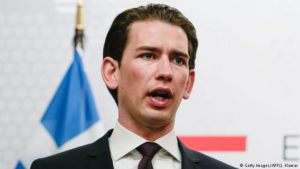Right wunderkind rides to power on fears of migration

Sebastian Kurz
Austrian voters have backed the centre-right and far-right political parties, shifting the political future of the country — and potentially that of all Europe.
At the centre of Austria’s political shift is Sebastian Kurz, a 31-year-old wunderkind who rode a wave of anti-immigrant anxiety to position himself as the country’s next chancellor and the world’s youngest national leader.
Kurz is currently Austria’s foreign minister and has advocated a hard line on welcoming migrants.
He has called for the winding back of benefits for newcomers and has made it his mission as foreign minister that shut down the so-called “Balkan” route asylum seekers were taking over land toward Austria and Germany.
So who is Sebastian Kurz?
The Austrians call him Wunderwuzzi ‘the whiz kid’. He took over the Austrian People’s Party in May and it was Kurz who called for snap elections shortly after, sensing the political temperature and realising the country was ripe for a political realignment toward the right.
The People’s Party has been around for decades but Kurz hit the party with an ambush makeover, bringing the party into the social media age. He changed the party’s name from just the People’s Party to ‘The Sebastian Kurz list — The New People’s Party’ and gathered up newcomers to join his political list.
Kurz invited in people who had never before served in government and began to propel the party on charisma.
Known as much for style as for substance, Kurz sports crisp suits and stylishly coiffed hair. He is not married although he lives with his girlfriend.
Kurz was born in 1986, the year Donald Trump was married to Ivana, Ronald Reagan was president of the United States and Kurt Waldheim, a man who controversially had his own Nazi past, was campaigning to become Austrian Chancellor.
The real winner in the election is the right-wing, anti-immigrant Freedom Party which gained more than a quarter of the vote and dragged the conservative People’s Party’s platform to the right on immigration issues.
It is expected Kurz will break his party’s decade-long grand coalition with the centre-left Social Democrats and form a government with the far-right instead.
But whoever he teams up with, his platform shared the Freedom Party’s positions on border controls, deportations, and radical Islam.
So, at least some of these positions will become policy in his administration, even if he decides that the idea of forming a government with a partner that attracts a neo-Nazi fringe is beyond the pale.
Kurz has played a role in the government’s reversal of Austria’s previously welcoming refugee policy last year, and he oversaw the tightening of borders on the Balkan route to reduce the influx of migrants.
He has guided his party toward a harder line on immigration, riding voters’ fears of Islam and resentment of their country becoming a way station for people seeking better lives in Germany or France.
Kurz has done a similar thing to Donald Trump in recasting a nationalist conservative ideology as his own movement and winning votes by promising to crackdown on migrants.
But his youth and political experience make him a more compelling and polished proponent of populist nationalism.
As with some elements of Brexit, Kurz has succeeded by specifically targeting immigration and Islamophobia. He favours tighter border controls, lower caps on refugee admissions, lower benefits for those who stay, expedited deportation of rejected asylum seekers and a crackdown on radical Islam.
He shares the far-right’s skepticism of the European Union but seems not to have the support or courage to take Austria out of it.
But however Austrian politics plays out in the coming months, Liberal democracy in Europe appears now to be on the run and the issue forcing the shift is how to respond to the migrant crisis that is destabilising the continent.
Laurie Nowell
AMES Australia Senior Journalist












